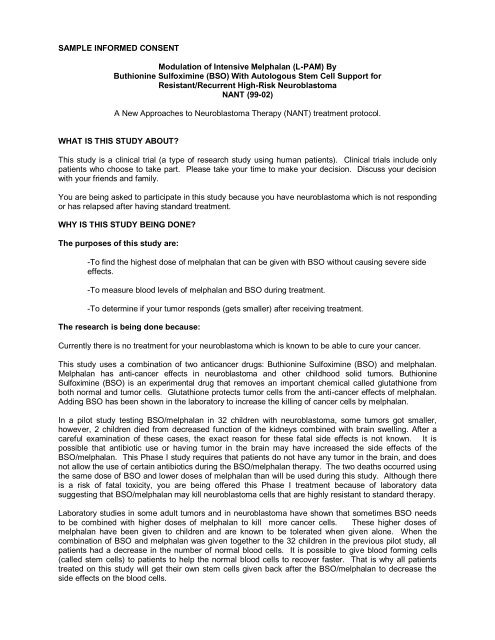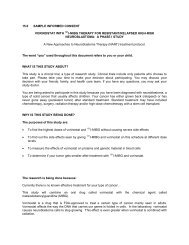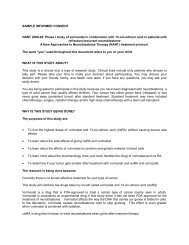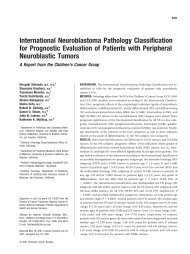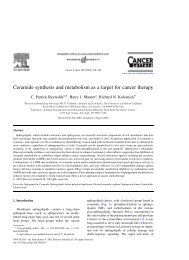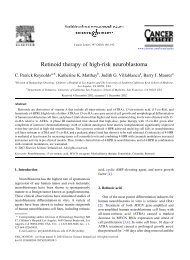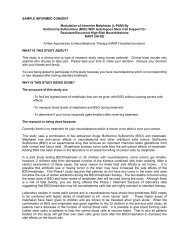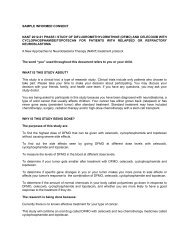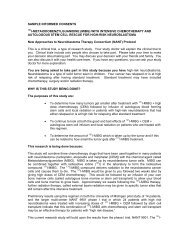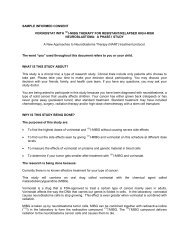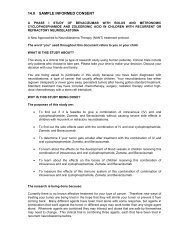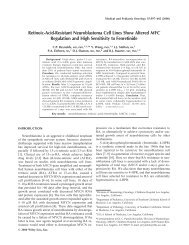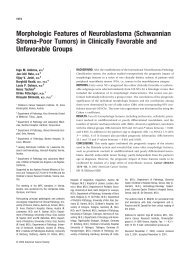Download a sample consent form for this study - NANT
Download a sample consent form for this study - NANT
Download a sample consent form for this study - NANT
Create successful ePaper yourself
Turn your PDF publications into a flip-book with our unique Google optimized e-Paper software.
SAMPLE INFORMED CONSENT<br />
Modulation of Intensive Melphalan (L-PAM) By<br />
Buthionine Sulfoximine (BSO) With Autologous Stem Cell Support <strong>for</strong><br />
Resistant/Recurrent High-Risk Neuroblastoma<br />
<strong>NANT</strong> (99-02)<br />
A New Approaches to Neuroblastoma Therapy (<strong>NANT</strong>) treatment protocol.<br />
WHAT IS THIS STUDY ABOUT?<br />
This <strong>study</strong> is a clinical trial (a type of research <strong>study</strong> using human patients). Clinical trials include only<br />
patients who choose to take part. Please take your time to make your decision. Discuss your decision<br />
with your friends and family.<br />
You are being asked to participate in <strong>this</strong> <strong>study</strong> because you have neuroblastoma which is not responding<br />
or has relapsed after having standard treatment.<br />
WHY IS THIS STUDY BEING DONE?<br />
The purposes of <strong>this</strong> <strong>study</strong> are:<br />
-To find the highest dose of melphalan that can be given with BSO without causing severe side<br />
effects.<br />
-To measure blood levels of melphalan and BSO during treatment.<br />
-To determine if your tumor responds (gets smaller) after receiving treatment.<br />
The research is being done because:<br />
Currently there is no treatment <strong>for</strong> your neuroblastoma which is known to be able to cure your cancer.<br />
This <strong>study</strong> uses a combination of two anticancer drugs: Buthionine Sulfoximine (BSO) and melphalan.<br />
Melphalan has anti-cancer effects in neuroblastoma and other childhood solid tumors. Buthionine<br />
Sulfoximine (BSO) is an experimental drug that removes an important chemical called glutathione from<br />
both normal and tumor cells. Glutathione protects tumor cells from the anti-cancer effects of melphalan.<br />
Adding BSO has been shown in the laboratory to increase the killing of cancer cells by melphalan.<br />
In a pilot <strong>study</strong> testing BSO/melphalan in 32 children with neuroblastoma, some tumors got smaller,<br />
however, 2 children died from decreased function of the kidneys combined with brain swelling. After a<br />
careful examination of these cases, the exact reason <strong>for</strong> these fatal side effects is not known. It is<br />
possible that antibiotic use or having tumor in the brain may have increased the side effects of the<br />
BSO/melphalan. This Phase I <strong>study</strong> requires that patients do not have any tumor in the brain, and does<br />
not allow the use of certain antibiotics during the BSO/melphalan therapy. The two deaths occurred using<br />
the same dose of BSO and lower doses of melphalan than will be used during <strong>this</strong> <strong>study</strong>. Although there<br />
is a risk of fatal toxicity, you are being offered <strong>this</strong> Phase I treatment because of laboratory data<br />
suggesting that BSO/melphalan may kill neuroblastoma cells that are highly resistant to standard therapy.<br />
Laboratory studies in some adult tumors and in neuroblastoma have shown that sometimes BSO needs<br />
to be combined with higher doses of melphalan to kill more cancer cells. These higher doses of<br />
melphalan have been given to children and are known to be tolerated when given alone. When the<br />
combination of BSO and melphalan was given together to the 32 children in the previous pilot <strong>study</strong>, all<br />
patients had a decrease in the number of normal blood cells. It is possible to give blood <strong><strong>for</strong>m</strong>ing cells<br />
(called stem cells) to patients to help the normal blood cells to recover faster. That is why all patients<br />
treated on <strong>this</strong> <strong>study</strong> will get their own stem cells given back after the BSO/melphalan to decrease the<br />
side effects on the blood cells.
HOW MANY PEOPLE WILL TAKE PART IN THIS STUDY?<br />
Between 18 to 36 people will take part in <strong>this</strong> <strong>study</strong>.<br />
WHAT WILL HAPPEN IF I TAKE PART IN THIS RESEARCH STUDY?<br />
Be<strong>for</strong>e you begin the <strong>study</strong>, you will need to have the following exams, tests, or procedures done to find<br />
out if you can be in the <strong>study</strong>. These are part of regular cancer care and may be done even if you do not<br />
join the <strong>study</strong>.<br />
Stem Cell Collection<br />
Be<strong>for</strong>e you can get treatment on <strong>this</strong> <strong>study</strong>, stem cells must be stored from your bone marrow or<br />
peripheral blood. If you need to have stem cells collected, you will be given a separate <strong>consent</strong> <strong><strong>for</strong>m</strong> to<br />
sign. If you have stem cells already stored and they meet the <strong>study</strong> requirements, then they may be used<br />
<strong>for</strong> <strong>this</strong> <strong>study</strong>. If you do not have enough stem cells stored you will not be able to participate in <strong>this</strong> <strong>study</strong>.<br />
<br />
Exams/Tests/Procedures -- Be<strong>for</strong>e the Study Starts<br />
Physical Exam Various scans 2<br />
Blood tests<br />
Tests of kidney function<br />
Bone marrow tests 1<br />
Tests of heart and lung function<br />
Pregnancy test<br />
Urine tests<br />
1 Bone marrow tests are done by inserting a needle into the hip bone to remove the marrow which is the<br />
soft tissue inside the bone that makes blood cells, <strong>for</strong> <strong>study</strong> and diagnosis.<br />
2 Various scans are done to see how the tumor responds to the treatment including CT/MRI scans and<br />
MIBG scans.<br />
Exams/Tests/Procedures – During the Study<br />
If the exams, tests and procedures show that you can be in the <strong>study</strong>, and you choose to take part, then<br />
you will need the following tests and procedures. They are part of regular cancer care.<br />
Physical Exam including a neurological exam<br />
Blood tests<br />
Urine tests<br />
Because you are in <strong>this</strong> <strong>study</strong>, physical exams, neurological exams, blood and urine tests that are part of<br />
your regular cancer care will be done more often.<br />
Physical exams will be done at least once a week.<br />
Neurological exams will be done daily at the start of treatment and then decrease to weekly by 4<br />
weeks after treatment.<br />
Blood and urine tests will be done daily at the start of treatment and then decrease to weekly by 4<br />
weeks after treatment<br />
You will be asked if you want to participate in research tests that are done to see how the <strong>study</strong> is<br />
affecting your body. This part of the <strong>study</strong> is voluntary. You can decide not to let the doctors do these<br />
tests and still be able to be treated with BSO/melphalan as part of <strong>this</strong> clinical <strong>study</strong>. The test results do<br />
not affect your treatment with BSO/melphalan and will not be told toyour doctor or become part of your<br />
medical record. There are checkboxes on the next to last page of <strong>this</strong> <strong>consent</strong> <strong><strong>for</strong>m</strong> to mark whether you<br />
are willing to participate in these voluntary studies.<br />
Determining the blood levels of BSO and Melphalan (called pharmacokinetics)<br />
Part of the research goal <strong>for</strong> <strong>this</strong> <strong>study</strong> is to look at blood levels of BSO and melphalan. For these tests,<br />
3 ml of blood (about ½ teaspoon) will be drawn from a vein at 18 different times (total 54ml or 11<br />
teaspoons) over several days while you are (your child) is in the hospital getting the treatment. You may<br />
need a blood transfusion after having all these <strong>sample</strong>s drawn. These drug levels must be drawn from<br />
an IV that is different from the one where the BSO and melphalan are being given.
Determining the level of glutathione (GSH) in the blood<br />
Ten ml of blood will be drawn from a vein twice (total 4 teaspoons) to learn more about the effects of BSO<br />
on glutathione levels in the blood.<br />
When I am finished taking BSO/melphalan:<br />
You will have an evaluation to see how your neuroblastoma responded to <strong>this</strong> treatment. You will repeat<br />
all the same tests you had done when you were preparing to enter on the <strong>study</strong>.<br />
<br />
Protocol Treatment with BSO / melphalan:<br />
BSO and melphalan are given by IV. Both drugs may be given through a central line.<br />
See diagram of treatment below: Only one course of <strong>this</strong> treatment will be given. On the first day BSO is<br />
given by IV over 30 minutes followed by a continuous infusion of BSO <strong>for</strong> 3 days. Melphalan is given IV<br />
over 20 minutes on 2 days. The stem cells will be infused into the central line, 24 hours after the infusion<br />
of BSO has finished. Four hours after the stem cell infusion, G-CSF (a medicine to help the growth of<br />
white blood cells), will be given either as an injection under the skin or by IV every day until enough white<br />
blood cells are present in the blood to fight infection.<br />
Day -4 Day -3 Day -2 Day -1 Day 0<br />
BSO BSO BSO BSO Stem cell infusion<br />
BSO IV over 30 minutes (Day 1) then continuously x 3 days (Day-4 to Day -1) and G-CSF<br />
Melphalan Melphalan<br />
Dose escalation of BSO/melphalan<br />
The dose of BSO will be the same <strong>for</strong> all patients. The dose of melphalan will be increased in groups of 3<br />
patients at a time until the highest dose that can be given without causing serious side effects is found.<br />
This <strong>study</strong> will start at dose levels of melphalan that are known to be safe without stem cell support and<br />
will increase the dose of melphalan until other kinds of side effects are seen. Doses are not increased<br />
within groups of patients.<br />
To prevent severe effects to the liver by BSO: NO ACETAMINOPHEN (Tylenol) or acetaminophen<br />
containing products may be taken beginning 7 days (1 week) be<strong>for</strong>e starting the drug BSO until 14<br />
days after the BSO infusion has finished. Your doctor will talk about other medicines that can be<br />
used instead of acetaminophen during <strong>this</strong> time.<br />
To possibly prevent severe side effects to the kidney:<br />
No antibiotics of any kind may be taken beginning 7 days be<strong>for</strong>e starting the drug BSO.<br />
Also specifically NO CEPHALOSPORIN ANTIBIOTICS may be taken beginning 7 days be<strong>for</strong>e<br />
starting the drug BSO until 14 days after the BSO infusion has finished. Your doctor will talk<br />
about other medicines which can be used during <strong>this</strong> time.<br />
You will remain hospitalized until after your neutrophil counts recover after you receiveyour stem<br />
cells. (usually about 2 weeks after stem cells are given).<br />
HOW LONG WILL I BE ON THIS STUDY?<br />
You will only get one treatment with BSO/melphalan. You will stay on <strong>this</strong> <strong>study</strong> <strong>for</strong> 84 days or <strong>for</strong> as long<br />
as it takes <strong>for</strong> your stem cells to regrow and make enough normal blood cells and <strong>for</strong> you to recover<br />
medically from any side effects. You will have an evaluation done to see how your neuroblastoma<br />
responded to <strong>this</strong> treatment. We would like to follow and observe you after the therapy is finished. You will<br />
continue to have tests and scans done to assess the status of your tumor. Your doctor will tell you how<br />
often these tests will be done. Researchers will continue to collect in<strong><strong>for</strong>m</strong>ation about about your disease<br />
until the cancer comes back or you get other treatment. In<strong><strong>for</strong>m</strong>ation will be collected <strong>for</strong> a lifetime about
whether you are still alive, whether you have developed any side effects from the treatment or any additional<br />
cancer. This in<strong><strong>for</strong>m</strong>ation may be gotten from your oncologist or family doctor at regular intervals.<br />
CAN I STOP BEING IN THE STUDY?<br />
Yes. If you are thinking about stopping the <strong>study</strong>, you should talk to your doctor be<strong>for</strong>e making a final<br />
decision so he/she can tell you how to do <strong>this</strong> safely. Once the dose of melphalan is high enough that<br />
your blood counts will not recover to normal levels without the stem cell infusion, it would be strongly<br />
recommended that you complete the medical supportive care needed to avoid very bad and possibly fatal<br />
side effects. The <strong>study</strong> doctor may stop you from taking part in <strong>this</strong> <strong>study</strong> at any time if he/she believes it<br />
is in your best interest; if you do not follow <strong>study</strong> rules; or if the <strong>study</strong> is stopped.<br />
WHAT SIDE EFFECTS OR RISKS CAN I EXPECT FROM BEING IN THE STUDY?<br />
This is a phase I <strong>study</strong>, which looks at theside effects <strong>for</strong> each patient at each different dose level <strong>for</strong> an<br />
experimental drug. Everyone taking part in the <strong>study</strong> will be watched carefully <strong>for</strong> any side effects.<br />
However, doctors don’t know all the side effects that may happen. Some side effects may be life<br />
threatening and it is possible that death courld occur as a rare side effect following treatment with<br />
BSO/melphalan. There were 2 deaths on the previous <strong>study</strong> of BSO and melphalan in 32 children.<br />
Since BSO has never previously been given with the higher doses of melphalan that are used in <strong>this</strong><br />
<strong>study</strong>, there may also be other side effects that we cannot predict. You should discuss these risks with<br />
your doctor. Other drugs will be given to make side effects less serious and more com<strong>for</strong>table. Many<br />
side effects go away shortly after the treatment is stopped, but in some cases, side effects may be long<br />
lasting or permanent. While on the <strong>study</strong> you are at risk <strong>for</strong> the side effects listed below<br />
Possible side effects of Buthionine Sulfoximine (BSO):<br />
Nausea and vomiting Common<br />
Abnormal liver function tests Common<br />
<br />
Decreased kidney function and brain swelling Rare<br />
In the previous pilot <strong>study</strong> done in pediatric patients, 2 children died out of the 32 children treated<br />
from decreased function of the kidneys combined with brain swelling. One of these children also<br />
was found to have tumor in the brain. The exact reason <strong>for</strong> these side effects is not known and<br />
there is no known treatment other than supportive care. In <strong>this</strong> current <strong>study</strong> we have instructions<br />
<strong>for</strong> close monitoring of brain and kidney function, and guidelines <strong>for</strong> when to stop the BSO<br />
infusion if changes in brain and kidney function are seen. We are also limiting the use of certain<br />
antibiotics be<strong>for</strong>e, during and after the BSO infusion due the effect they could have on the kidney.<br />
Further, patients will be tested to see if they have tumor in the brain, since <strong>this</strong> might increase the<br />
risk of brain swelling.<br />
Possible side effects of Melphalan:<br />
Mouth sores, mouth swelling and damage to the<br />
Gastrointestinal (GI) system<br />
Common<br />
Diarrhea<br />
Common<br />
Loss of appetite<br />
Common<br />
Abnormal liver function tests Occasional<br />
Abnormal kidney function tests Occasional<br />
Tingling or numbness in of the hands and feet (known as<br />
paresthesias)<br />
Rare<br />
Mucosits (irritation of mucous membranes)<br />
Common<br />
● Allergic reaction (may cause hives, and/or difficulty Rare<br />
breathing, and/or lowered blood pressure. Symptoms<br />
of an allergic reaction can be treated with anti-allergy<br />
medicines.)<br />
Effects on the peripheral nerves (abdominal pain, Occasional
constipation, clumsiness, or poor coordination, or<br />
abnormal sensations)<br />
Lung scarring known as stiff lungs or pulmonary fibrosis<br />
Irritation of the bladder<br />
Hair loss<br />
Difficulty breathing<br />
Production of a hormone that decreases urination and<br />
lowers blood levels of salts<br />
Rare<br />
Occasional<br />
Common<br />
Rare<br />
Rare<br />
Possible side effects of BSO in combination with Melphalan + Stem Cell Infusion:<br />
Nausea and vomiting Common<br />
Lowering of the number of blood cells Common<br />
Some of the blood cells will be damaged or destroyed in all patients who get <strong>this</strong> treatment. At<br />
higher doses of melphalan <strong>this</strong> might be fatal if you was not “rescued” by the stem cell infusion.<br />
Stem cells make white blood cells, red blood cells and platelets which are needed <strong>for</strong> you to live.<br />
Until the new stem cells begin making enough of the new blood cells, you will have side effects<br />
from having low blood cells. Side effects of low blood cells may include infection, bruising and /or<br />
bleeding, pale color, and/or fatigue<br />
Skin Damage Red skin is common. Blistering or peeling skin is<br />
not as common.<br />
Kidney damage Rare<br />
Veno-occlusive disease of the liver Rare<br />
Veno-occlusive (VOD) is a scarring of the small blood vessels in the liver. When <strong>this</strong> happens,<br />
fluid collects in the abdomen or lungs, weight increases, yellow jaundice may occur, and an<br />
increased tendency <strong>for</strong> bleeding may happen. The risk <strong>for</strong> VOD may increase using BSO and<br />
melphalan together since they both have effects on the liver.<br />
Multiple organ system failure Rare<br />
Bone marrow dysfunction Rare<br />
Treatment with BSO + Melphalan can affect the body such that the new stem cells may not be<br />
able to grow and make blood cells or that the blood cells would grow but not return to normal<br />
levels. If <strong>this</strong> happens, back-up stem cells may be used if they are available or growth factors also<br />
may be given to try to improve stem cell growth.<br />
Possible side effects of Granulocyte Colony Stimulating Factor (G-CSF):<br />
G-CSF is not an anti-cancer medicine. It helps the growth of white blood cells, which fight infection.<br />
Fever, chills, nausea, headache, malaise = Common<br />
flu-like symptoms<br />
Bone pain Common<br />
Low blood pressure Rare<br />
Shortness of breath Rare<br />
Enlargement of spleen Rare<br />
Possible side effects associated with stem cells:<br />
ANYTIME BEFORE STEM CELL INFUSION: The freezer where PBSC are stored could<br />
malfunction, the container holding them could break and the stem cells could be damaged so<br />
they could not be used. This is expected to be an extremely rare event, however, if it occurs,<br />
another stem cell collection may be attempted or the back-up stem cells (if available) may be<br />
used if they were not damaged.<br />
<br />
<br />
Shipping of stem cells: If your stem cells need to be shipped, there is a small risk they could be<br />
lost or damaged in the shipping process such that they could not be used. This is expected to be<br />
an extremely rare event. If <strong>this</strong> occurs, another stem cell collection may be attempted or the<br />
back-up stem cells, if available, may be used.<br />
PURGED STEM CELLS ONLY: Purging may injure the normal stem cells so they will not grow to<br />
make a normal working bone marrow after they are infused. This is expected to be an extremely
are event, but could be fatal if it happened. There would be the option to give medicine(s) to<br />
stimulate bone marrow growth, or infuse additional back-up stem cells, if they are available.<br />
Possible side effects of stem cell infusion:<br />
Fever and chills Common<br />
Blood in urine Common<br />
Allergic reaction Rare<br />
Increased blood pressure Rare<br />
Infection Rare<br />
Infusion of tumor cells Rare<br />
Tumor cells may still be present in the harvested stem cells and they could regrow in the patient<br />
receiving them.<br />
Possible long term side effects of <strong>this</strong> treatment:<br />
Recurrence of the tumor<br />
Infection<br />
Sterility and / or delayed onset of sexual maturity<br />
Increased risk of having a second cancer different from the kind of cancer you have now.<br />
Reproductive Risks:<br />
You should not become pregnant or father a baby while on <strong>this</strong> <strong>study</strong> because the drugs in <strong>this</strong> <strong>study</strong> can<br />
affect an unborn baby. Women should not breastfeed a baby while on <strong>this</strong> <strong>study</strong>. It is important you<br />
understand that you need to use birth control while on <strong>this</strong> <strong>study</strong>. Check with your <strong>study</strong> doctor about<br />
what kind of birth control methods to use and how long to use them.<br />
ARE THERE BENEFITS TO TAKING PART IN THE STUDY?<br />
Taking part in <strong>this</strong> <strong>study</strong> may or may not make your health better. We hope the in<strong><strong>for</strong>m</strong>ation learned from<br />
<strong>this</strong> <strong>study</strong> will benefit other patients with pediatric solid tumors.<br />
WHAT OTHER CHOICES DO I HAVE IF I DO NOT TAKE PART IN THIS STUDY?<br />
There are other options <strong>for</strong> treatment. You may get other therapy even if you do not take part in the<br />
<strong>study</strong>. Instead of being in <strong>this</strong> <strong>study</strong>, you have these options:<br />
<br />
<br />
<br />
<br />
Treatment with a different chemotherapy regimen using stem cell support.<br />
Treatment with combinations of anti-cancer medicines in lower doses that do not need<br />
stem cell support.<br />
Other experimental agents that are available<br />
No therapy at <strong>this</strong> time with care to help you feel more com<strong>for</strong>table.<br />
Please talk about these options with your doctor as well as other trusted personal and family advisors.<br />
WILL MY MEDICAL INFORMATION BE KEPT PRIVATE?<br />
You may read your record. We will do our best to make sure that the personal in<strong><strong>for</strong>m</strong>ation in your<br />
medical record will be kept private. However we cannot guarantee total privacy. Your personal<br />
in<strong><strong>for</strong>m</strong>ation will be given out if required by law. If in<strong><strong>for</strong>m</strong>ation from <strong>this</strong> <strong>study</strong> is published or presented at<br />
scientific meetings, your name and other personal in<strong><strong>for</strong>m</strong>ation will not be used.<br />
Organizations that may look at and/or copy your research records <strong>for</strong> quality assurance and data analysis<br />
include such groups as:<br />
<br />
<br />
New Approaches To Neuroblastoma Therapy (<strong>NANT</strong>) Consortium at Childrens Hospital<br />
Los Angeles in Los Angeles, CA. The <strong>NANT</strong> Consortium identifies you (your child) by a<br />
number.<br />
Independent auditor to monitor quality assurance <strong>for</strong> the <strong>NANT</strong> Consortium
The Investigational New Drug Sponsor (the supplier) of BSO, Dr. C. Patrick Reynolds,<br />
MD PhD, Texas Tech University Health Sciences Center.<br />
The Federal Government – National Cancer Institute (NCI) and the Food and Drug<br />
Administration (FDA) may examine records of patients participating in <strong>this</strong> <strong>study</strong>.<br />
<strong>NANT</strong> has received a Certificate of Confidentiality from the federal government, which will help us<br />
protect the privacy of our research subjects. In<strong><strong>for</strong>m</strong>ation about the certificate is included at the<br />
end of <strong>this</strong> <strong>consent</strong>.<br />
WHAT ARE THE COSTS OF TAKING PART IN THIS STUDY?<br />
C. Patrick Reynolds, MD PhD of Texas Tech University Health Sciences Center as the Investigational<br />
New Agent (IND) sponsor will supply the <strong>NANT</strong> Consortium with the investigational agent BSO free of<br />
charge <strong>for</strong> <strong>this</strong> <strong>study</strong>. If during the <strong>study</strong> BSO becomes commercially available, you may have to pay <strong>for</strong><br />
the amount of drug needed to complete the <strong>study</strong>.<br />
Melphalan is commercially available. You will pay <strong>for</strong> the amount of drug you need to complete <strong>this</strong><br />
<strong>study</strong>. This cost is normally covered by your insurance company.<br />
The tests <strong>for</strong> BSO/melphalan pharmacokinetics and GSH in the blood will be done at no extra cost to you<br />
if you agree to participate in these voluntary tests. However, you or your health plan may need to pay ofr<br />
the costs of the supplies and personnel who withdraw the blood <strong>sample</strong>s <strong><strong>for</strong>m</strong> you.<br />
Your insurance company will be charged <strong>for</strong> continuing medical care and / or hospitalization. Taking part<br />
in <strong>this</strong> <strong>study</strong> may lead to added costs to your insurance company. Please ask about any expected added<br />
costs or insurance problems.<br />
You will receive no payment <strong>for</strong> taking part in <strong>this</strong> <strong>study</strong>.<br />
You may have to pay <strong>for</strong> other things during <strong>this</strong> <strong>study</strong>, such as but not limited to, your time, the cost of<br />
food you buy while you are being treated at the hospital, carfare, parking, and baby sitter fees.<br />
For more in<strong><strong>for</strong>m</strong>ation on clinical trials and insurance coverage, you can visit the National Cancer<br />
Institute’s web site at http://cancer.gov/clinicaltrials/understanding/insurance-coverage. You can print a<br />
copy of the “Clinical Trials and Insurance Coverage” in<strong><strong>for</strong>m</strong>ation from <strong>this</strong> Web site.<br />
Another way to get the in<strong><strong>for</strong>m</strong>ation is to call 1-800-4-CANCER (1-800-422-6237) and ask them to send<br />
you a free copy.<br />
WHAT HAPPENS IF I AM INJURED BECAUSE I TOOK PART IN THIS STUDY?<br />
It is important that you tell your <strong>study</strong> doctor, _______________, if you feel that you have been injured<br />
because of taking part in <strong>this</strong> <strong>study</strong>. You can tell the doctor in person or call him/her at ______________.<br />
You will get medical treatment if you are injured as a result of taking part in <strong>this</strong> <strong>study</strong>. You and/or your<br />
health plan will be charged <strong>for</strong> <strong>this</strong> treatment. The <strong>study</strong> will not pay <strong>for</strong> medical treatment due to injury<br />
while being on <strong>this</strong> <strong>study</strong>.<br />
WHAT ARE MY RIGHTS IF I TAKE PART IN THIS STUDY?<br />
Taking part in <strong>this</strong> <strong>study</strong> is your choice. You may choose either to take part or not to take part in the<br />
<strong>study</strong>. If you decide to take part, you may leave the <strong>study</strong> at any time. No matter what decision you<br />
make, there will be no penalty to you and ou will not lose any of your regular benefits. Leaving the <strong>study</strong><br />
will not affect your medical care. You can still get your medical care <strong>for</strong> our institution.<br />
We will tellyou about new in<strong><strong>for</strong>m</strong>ation or changes that may affect your health, welfare, or your willingness<br />
to stay in the <strong>study</strong>.<br />
In case of injury resulting from <strong>this</strong> <strong>study</strong>, you do not lose any of your legal rights to seek payment by<br />
signing <strong>this</strong> <strong><strong>for</strong>m</strong>.
A Data Safety and Monitoring Board, an independent group of experts, will be reviewing data <strong><strong>for</strong>m</strong> <strong>this</strong><br />
research throughout the <strong>study</strong>. We will tell you about new in<strong><strong>for</strong>m</strong>ation from <strong>this</strong> board or other studies<br />
that may affect yoru health or willingness to stay in the <strong>study</strong>.<br />
WHO CAN ANSWER MY QUESTIONS ABOUT THE STUDY?<br />
You can talk to your <strong>study</strong> doctor about any questions or concerns you have about <strong>this</strong> <strong>study</strong>. Contact<br />
your <strong>study</strong> doctor_______________ at __________________.<br />
For questions about yoru rights while taking part in <strong>this</strong> <strong>study</strong>, call the _______________________<br />
Institutional Review Board (a group of people who review the research to protect yoru rights) at<br />
___________.<br />
WHERE CAN I GET MORE INFORMATION?<br />
You may call the NCI’s Cancer In<strong><strong>for</strong>m</strong>ation Service at<br />
1–800–4–CANCER (1–800–422–6237) or TTY: 1–800–332–8615<br />
You may visit the NCI at http://cancer.gov/<br />
1. For NCI’s clinical trials in<strong><strong>for</strong>m</strong>ation, go to http://cancer.gov/clinicaltrials/<br />
2. For NCI’s general in<strong><strong>for</strong>m</strong>ation about cancer, go to http://cancer.gov/cancerinfo/<br />
You will get a copy of <strong>this</strong> <strong>consent</strong> <strong><strong>for</strong>m</strong>. If you want more in<strong><strong>for</strong>m</strong>ation about <strong>this</strong> <strong>study</strong>, ask your <strong>study</strong><br />
doctor.<br />
A description of <strong>this</strong> clinical trial will be available on http://www.ClinicalTrials.gov, as required by U.S.<br />
Law. This website will not include in<strong><strong>for</strong>m</strong>ation that can identify you. At most, the website will include a<br />
summary of the results. You can search <strong>this</strong> website at anytime.
CONSENT FOR EXTRA STUDIES FOR RESEARCH<br />
Blood Levels of BSO and Melphlan (Pharmacokinetics)<br />
#1 Circle YES, if you agree to let researchers take up to 54ml of blood (11 teaspoons) to test blood<br />
levels of BSO and melphalan. This will be done in 18 extra blood draws. This blood must be taken from<br />
an IV different from the one used <strong>for</strong> the bso + melphalan treatment. You may need to have another iv<br />
started to get these <strong>sample</strong>s. The results of these tests will be confidential and not made available to you<br />
or your treating doctor.<br />
Circle NO if you do not want researchers to take extra blood <strong>sample</strong>s <strong>for</strong> BSO + Melphalan<br />
pharmacokinetics.<br />
#1 YES NO<br />
Signature Participant:____________________<br />
DATE: _____________<br />
Blood Levels of GSH (glutathione)<br />
#2 Circle YES, if you agree to let researchers take 20 ml of blood (4 teaspoons) to test blood levels of<br />
GSH. This will be done in 2 extra blood draws. This blood must be taken from an IV different from the<br />
one used <strong>for</strong> the bso + melphalan treatment. The results of these tests will be confidential and not made<br />
available to you or your treating doctor.<br />
Circle NO if you do not want researchers to take extra blood <strong>sample</strong>s <strong>for</strong> GSH.<br />
#2 YES NO<br />
Signature Participant:____________________<br />
DATE: _____________
STATEMENT OF CONSENT<br />
I have been given a copy of all ________ pages of <strong>this</strong> <strong><strong>for</strong>m</strong>. I have read it or it has been read to me. I<br />
understand the in<strong><strong>for</strong>m</strong>ation and have had my questions answered. I agree to take part in <strong>this</strong> <strong>study</strong>.<br />
_____________________________________<br />
Patient Name<br />
______________________________________<br />
Signature of Parent or Guardian<br />
_____/_____/_____<br />
Date<br />
______________________________________<br />
Signature of Parent or Guardian<br />
_____/_____/_____<br />
Date<br />
______________________________________<br />
Signature of Patient (If > 7 years old)<br />
_____/_____/_____<br />
Date<br />
___________________________________________<br />
Signature of Physician or<br />
Responsible Investigator<br />
_____/_____/______<br />
Date<br />
_______________________________________<br />
Signature of Witness<br />
Date<br />
____/_____/______<br />
_______________________________________<br />
Signature of Translator<br />
(If applicable)<br />
Date<br />
____/_____/______
CONSENT ADDENDUM #1<br />
A blank box means the test is not done at that time point in the <strong>study</strong>.<br />
Tests that will be done on <strong>this</strong> <strong>study</strong>.<br />
STUDIES TO BE OBTAINED Pre-Study Day –4<br />
through<br />
Day 0<br />
Day 0 through<br />
Day +28<br />
Day +28<br />
through<br />
Day +84<br />
Off<br />
Protocol<br />
Therapy<br />
Physical Exam X X Weekly Weekly until normal X<br />
Neurological exam Daily Once each week X<br />
Blood and/or urine tests X Daily Daily days 0-7,<br />
then 2x/week<br />
X<br />
Kidney test X X<br />
Test of lung function only if necessary X X<br />
Heart test (echocardiogram/MUGA<br />
and EKG)<br />
X X<br />
Chest X-Ray X<br />
Head Imaging (CT/MRI)<br />
Tumor Imaging with CT/MRI and<br />
MIBG scans<br />
X<br />
X X<br />
Urine test (VMA/HVA) X X<br />
Bilateral bone marrow aspirate and<br />
biopsy <strong>for</strong> routine morphology<br />
X X<br />
Tests below <strong>this</strong> line would only be done if you gave permission <strong>for</strong> them to be done.<br />
Blood levels of BSO and Melphalan<br />
(OPTIONAL)<br />
Blood levels of GSH<br />
(Optional)<br />
X<br />
Day-4 and<br />
Day –2
CONSENT ADDENDUM #2<br />
Certificate of Confidentiality In<strong><strong>for</strong>m</strong>ation<br />
<strong>NANT</strong> has received a Certificate of Confidentiality from the federal government, which will help us<br />
protect the privacy of our research subjects. The Certificate protects against the involuntary<br />
release of in<strong><strong>for</strong>m</strong>ation about subjects collected during the course of our covered studies. The<br />
researchers involved in the studies cannot be <strong>for</strong>ced to disclose the identity or any in<strong><strong>for</strong>m</strong>ation<br />
collected in the <strong>study</strong> in any legal proceedings at the federal, state, or local level, regardless of<br />
whether they are criminal, administrative, or legislative proceedings. However, the subject or the<br />
researcher may choose to voluntarily disclose the protected in<strong><strong>for</strong>m</strong>ation under certain<br />
circumstances. For example, if the subject or his/her guardian requests the release of in<strong><strong>for</strong>m</strong>ation<br />
in writing, the Certificate does not protect against that voluntary disclosure. Furthermore, federal<br />
agencies may review our records under limited circumstances, such as a DHHS request <strong>for</strong><br />
in<strong><strong>for</strong>m</strong>ation <strong>for</strong> an audit or program evaluation or an FDA request under the Food, Drug and<br />
Cosmetics Act. The Certificate of Confidentiality will not protect against the required reporting by<br />
hospital staff of in<strong><strong>for</strong>m</strong>ation on suspected child abuse, reportable communicable diseases, and/or<br />
possible threat of harm to self or others.


